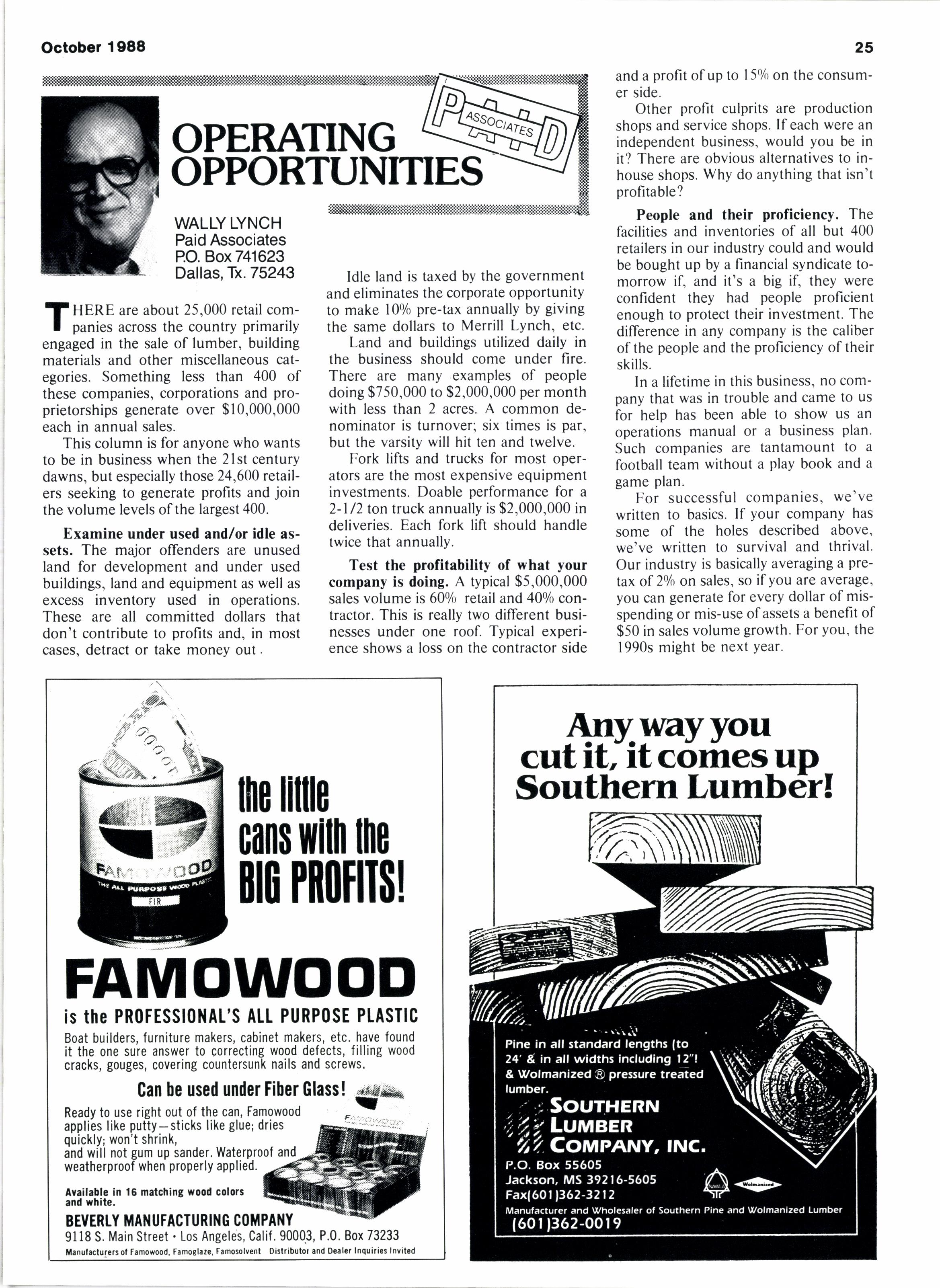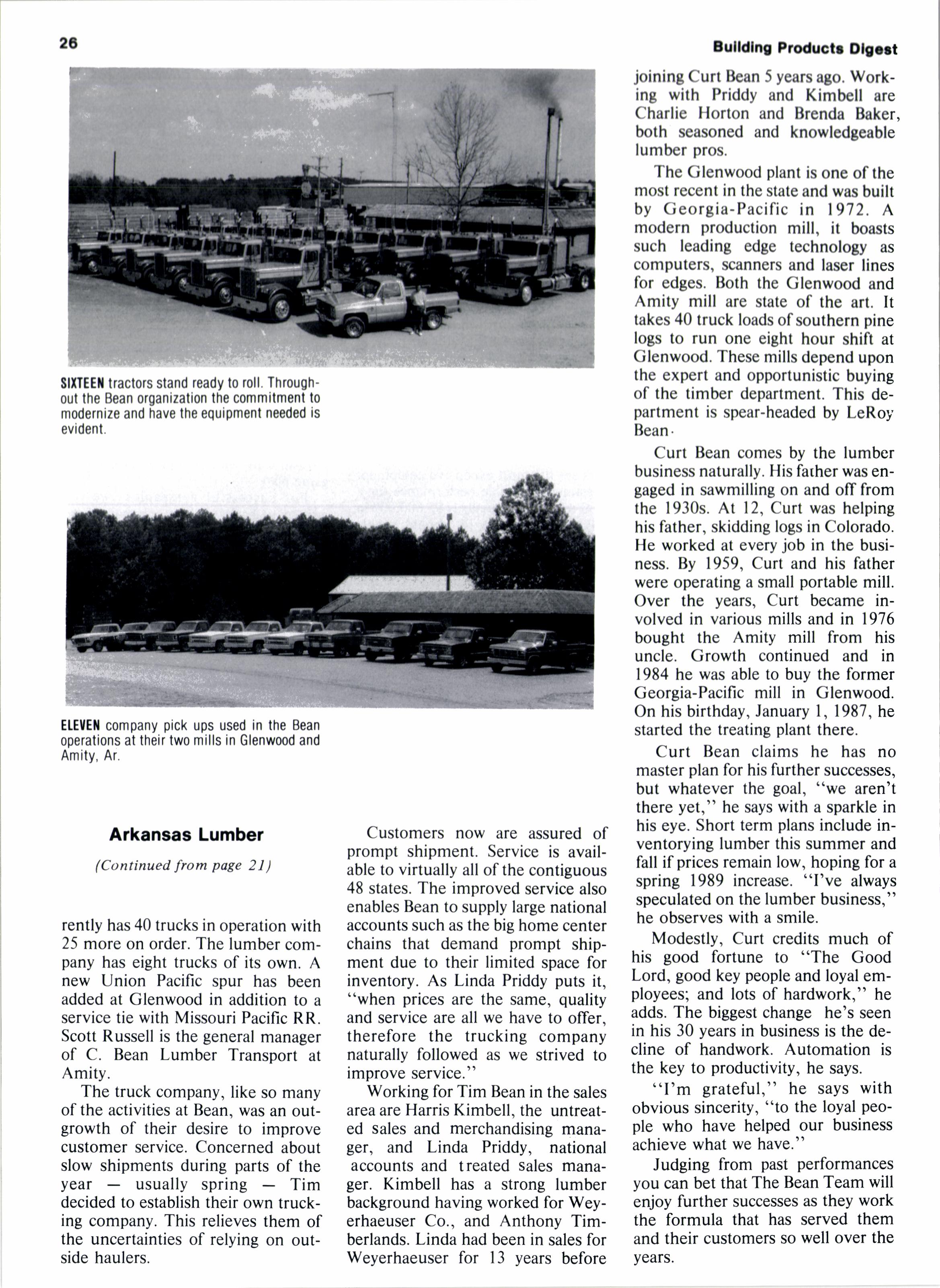
3 minute read
OPERANNG OPPORTUNITIES
WALLY LYNCH Paid Associates PO. Box 741623 Dallas, Tx.75243
f Hene are about 25,000 retail comI panies across the country primarily engaged in the sale of lumber, building materials and other miscellaneous categories. Something less than 400 of these companies, corporations and proprietorships generate over $10,000,000 each in annual sales.
This column is for anyone who wants to be in business when the 2lst century dawns, but especially those 24,600 retailers seeking to generate profits and join the volume levels of the largest 400.
Examine under used and/or idle assets. The major oflenders are unused land for development and under used buildings, land and equipment as well as excess inventory used in operations. These are all committed dollars that don't contribute to profits and, in most cases, detract or take money out.
ldle land is taxed by the government and eliminates the corporate opportunity to make 100/o pre-tax annually by giving the same dollars to Merrill Lynch, etc.
Land and buildings utilized daily in the business should come under fire. There are many examples of people doing $750,000 to $2,000,000 per month with less than 2 acres. A common denominator is turnover; six times is par, but the varsity will hit ten and twelve.
Fork lifts and trucks for most operators are the most expensive equipment investments. Doable performance for a 2-l /2 ton truck annually is $2,000,000 in deliveries. Each fork lift should handle twice that annually.
Test the profitability of what your company is doing. A typical $5,000,000 sales volume is 600/o retail and 400/o contractor. This is really two different businesses under one roof. Typical experience shows a loss on the contractor side and a profit of up to 1 50/o on the consumer side.
Other profit culprits are production shops and service shops. lfeach were an independent business, would you be in it? There are obvious alternatives to inhouse shops. Why do anything that isn't profitable?
People and their proficiency. The lacilities and inventories of all but 400 retailers in our industry could and would be bought up by a financial syndicate tomorrow il and it's a big il, they were confident they had people proficient enough to protect their investment. The difference in any company is the caliber of the people and the proficiency of their skills.
In a lifetime in this business, no company that was in trouble and came to us for help has been able to show us an operations manual or a business plan. Such companies are tantamount to a football team without a play book and a game plan.
For successful companies, we've written to basics. ll your company has some of the holes described above, we've written to survival and thrival. Our industry is basically averaging a prelaxof 2o/o on sales, so if you are average, you can generate for every dollar of misspending or mis-use of assets a benefit of $50 in sales volume growth. F'or you, the 1990s might be next year.
Arkansas Lumber
(Continued from page 21 ) rently has 40 trucks in operation with 25 more on order. The lumber company has eight trucks of its own. A new Union Pacific spur has been added at Glenwood in addition to a service tie with Missouri Pacific RR. Scott Russell is the general manager of C. Bean Lumber Transport at Amity.

The truck company, like so many of the activities at Bean. was an outgrowth of their desire to improve customer service. Concerned about slow shipments during parts of the year usually spring Tim decided to establish their own trucking company. This relieves them of the uncertainties of relying on outside haulers.
Customers now are assured of prompt shipment. Service is available to virtually all of the contiguous 48 states. The improved service also enables Bean to supply large national accounts such as the big home center chains that demand prompt shipment due to their limited space for inventory. As Linda Priddy puts it, "when prices are the same, quality and service are all we have to offer, therefore the trucking company naturally followed as we strived to improve service."
Working for Tim Bean in the sales area are Harris Kimbell, the untreated sales and merchandising manager, and Linda Priddy, national accounts and treated sales manager. Kimbell has a strong lumber background having worked for Weyerhaeuser Co., and Anthony Timberlands. Linda had been in sales for Weyerhaeuser for 13 years before









